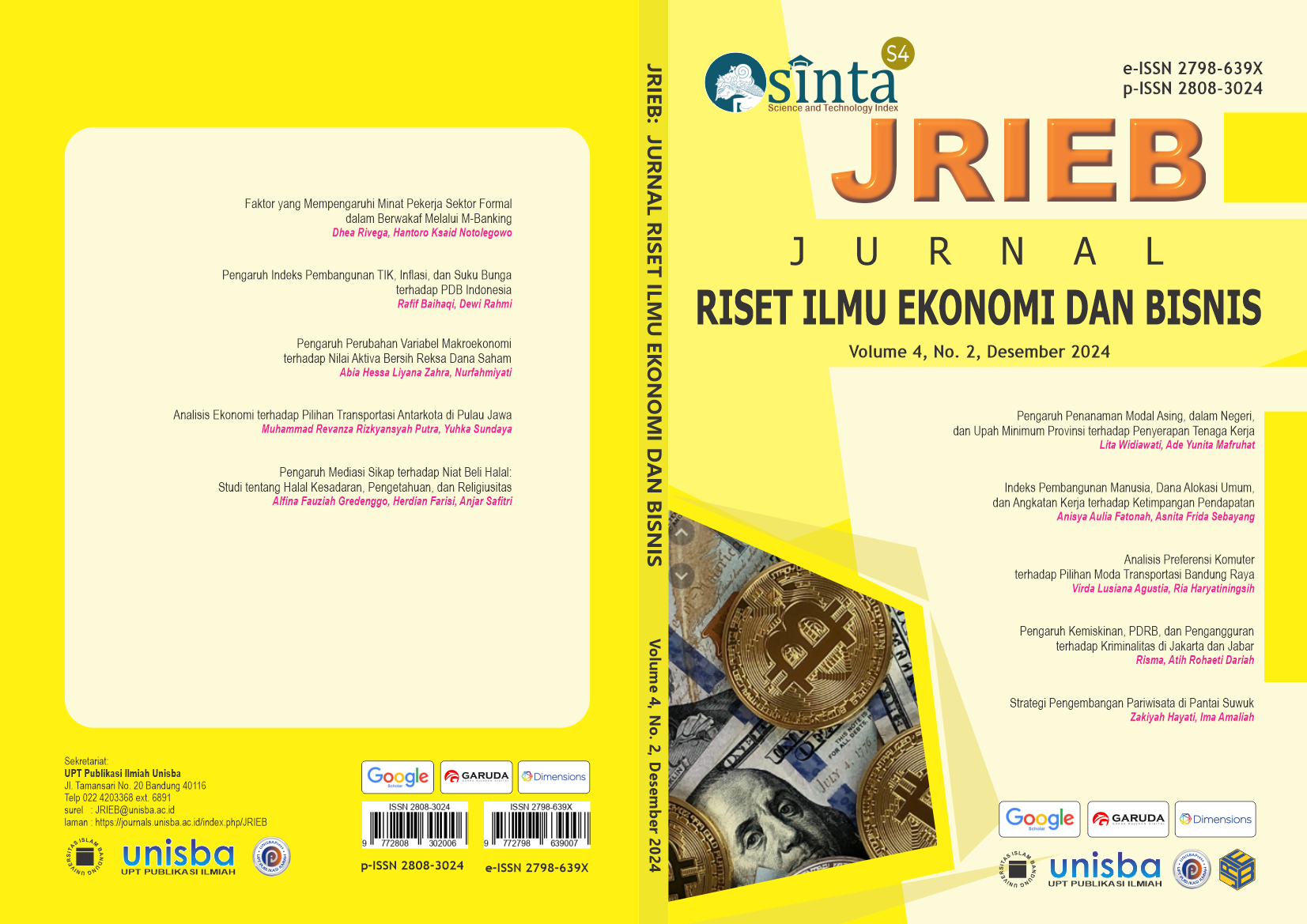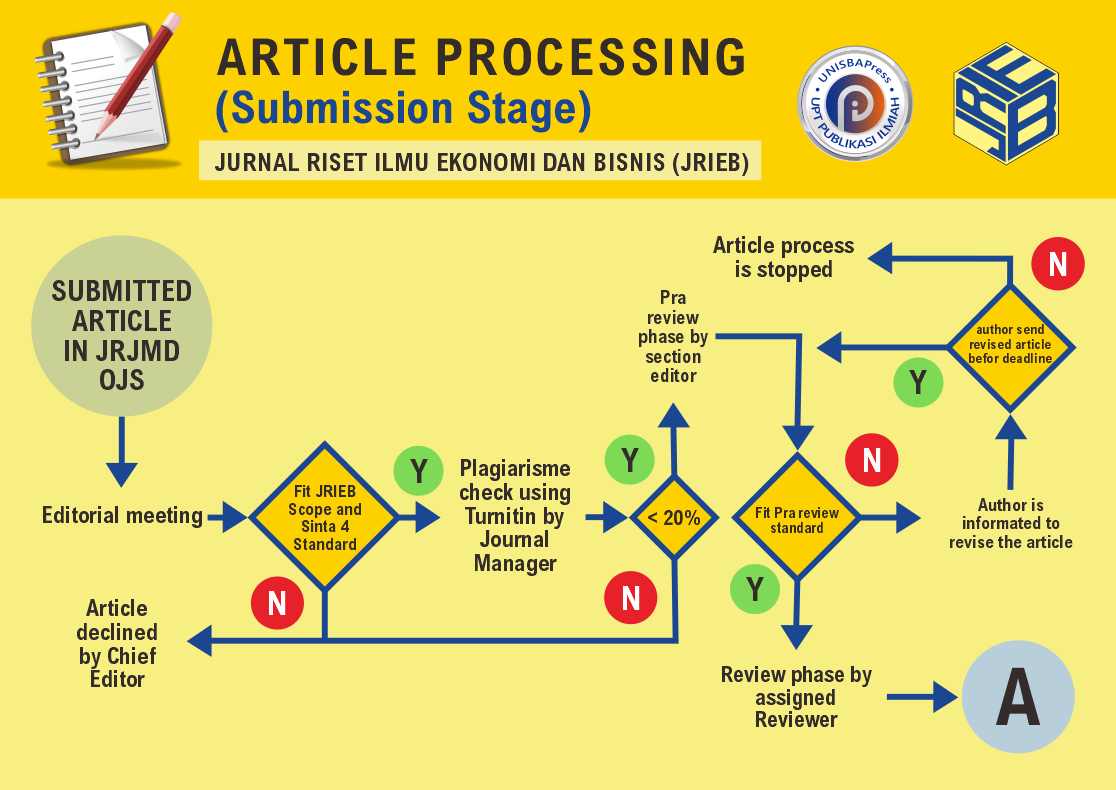Analisis Ekonomi terhadap Pilihan Transportasi Antarkota di Pulau Jawa
DOI:
https://doi.org/10.29313/jrieb.v4i2.5044Keywords:
Transportasi, Permintaan Transportasi, Kereta ApiAbstract
Abstrak. Penelitian ini menelusuri dampak faktor ekonomi dan non-ekonomi terhadap preferensi moda transportasi penumpang transportasi umum. Metode yang digunakan adalah tinjauan integratif dan ekonometrika QLDV (Qualitative Limited Dependent Variable) untuk mengevaluasi peluang pemilihan moda transportasi antarkota di Pulau Jawa. Data utama dikumpulkan melalui survei dengan cara random sampling, lalu dianalisis dengan regresi logistik multinomial untuk menjelaskan kaitan antara sifat ekonomi penumpang dan ciri-ciri transportasi dengan moda yang dipilih. Hasil analisis model multinomial logit menunjukkan bahwa pemilihan transportasi, seperti kereta api, bus, dan travel, dipengaruhi oleh faktor-faktor seperti tingkat pendapatan, harga tarif, dan durasi perjalanan. Hasil analisis mikroekonomi menunjukkan bahwa permintaan kereta api kurang responsif terhadap perubahan harga, sesuai dengan sifat monopoli yang dimiliki oleh PT. Kereta Api Indonesia (KAI). Di samping itu, naiknya pendapatan biasanya membuat penumpang lebih memilih kereta api daripada bus dan travel. Model ini dapat digunakan untuk mensimulasikan rekomendasi praktis dan merumuskan kebijakan transportasi.
Abstract. This study explores the impact of economic and non-economic factors on public transportation passenger mode preferences. The method used is an integrative review and econometric QLDV (Qualitative Limited Dependent Variable) to evaluate the opportunity for intercity transportation mode selection in Java Island. The main data were collected through a survey using random sampling, then analyzed using multinomial logistic regression to explain the relationship between passenger economic characteristics and transportation characteristics with the selected mode. The results of the multinomial logit model analysis show that the choice of transportation, such as trains, buses, and travel, is influenced by factors such as income level, fare price, and travel duration. The results of the microeconomic analysis show that train demand is less responsive to price changes, in accordance with the monopoly nature of PT. Kereta Api Indonesia (KAI). In addition, increasing income usually makes passengers prefer trains to buses and travel. This model can be used to simulate practical recommendations and formulate transportation policies.
References
Aini, W. (2021). Dampak Pembangunan Tol Trans-Jawa Pada Perekonomian. Kompas. Https://Www.Kompas.Id/Baca/Riset/2021/12/20/Dampak-Pembangunan-Tol-Trans-Jawa-Pada-Perekonomian
Ayu Julida Yanti, Sundaya, Y., & Haviz, M. (2021). Permintaan Wisata Kelompok Pemuda ke Kota Bandung. Jurnal Riset Ilmu Ekonomi Dan Bisnis, 1(1), 15–23. https://doi.org/10.29313/jrieb.v1i1.63
Bhat, C. R. (1995). A Heteroscedastic Extreme Value Model Of Intercity Travel Mode Choice. Transportation Research Part B: Methodological, 29(6), 471–483. Https://Doi.Org/Https://Doi.Org/10.1016/0191-2615(95)00015-6
Can, V. Van. (2013). Estimation Of Travel Mode Choice For Domestic Tourists To Nha Trang Using The Multinomial Probit Model. Transportation Research Part A: Policy And Practice, 49, 149–159. Https://Doi.Org/10.1016/J.Tra.2013.01.025
Forinash, C. V., & Koppelman, F. S. (1993). Application And Interpretation Of Nested Logit Models Of Intercity Mode Choice. Transportation Research Record 1413, 98–106. Https://Trid.Trb.Org/View/385097
Greene, W. H. (2003). Econometric Analysis. In Contributions To Finance And Accounting: Vol. Part F206. Delhi : Pearsons Education. Https://Doi.Org/10.1007/978-3-030-56239-7_5
Lave, L. B. (1972). The Demand For Intercity Passenger Transportation. Journal Of Regional Science, 12, 71–84. Https://Api.Semanticscholar.Org/Corpusid:154845625
Li, X., Zhang, S., Wu, Y., Wang, Y., & Wang, W. (2021). Exploring Influencing Factors Of Intercity Mode Choice From View Of Entire Travel Chain. Journal Of Advanced Transportation, 2021. Https://Doi.Org/10.1155/2021/9454873
McFadden, D. (1974). The measurement of urban travel demand. Journal of Public Economics, 3(4), 303–328. https://doi.org/https://doi.org/10.1016/0047-2727(74)90003-6
Millan, P., Baños-Pino, J., & Inglada, V. (1997). Marshallian Demands Of Intercity Passenger Transport In Spain: 1980-1992. An Economic Analysis. Transportation Research Part E: Logistics And Transportation Review, 33(2), 79–96. Https://Doi.Org/10.1016/S1366-5545(97)00005-7
Pratiwi, P. W., Sundaya, Y., & Mafruhat, A. Y. (2019). Analisis Peluang Pilihan Jenis Transportasi Umum Pada Masyarakat Kota Bandung. Prosiding Ilmu Ekonomi, 118-126.
Wijeweera, A., To, H., Charles, M. B., & Sloan, K. (2014). A Time Series Analysis Of Passenger Rail Demand In Major Australian Cities. Economic Analysis And Policy, 44(3), 301–309. Https://Doi.Org/10.1016/J.Eap.2014.08.003
Ramanuj, P., Varia, H., Shah, A., & Jain, A. M. (2023). Development Of Mode Choice Behavior Model For Inter-Regional Public Transport– A Case Study Of India. Suranaree Journal Of Science And Technology, 30(3). Https://Doi.Org/10.55766/Sujst-2023-03-E0113
Small, K. A., & Winston, C. (1998). The Demand For Transportation: Models And Applications. In Essays In Transportation Economics And Policy. A Handbook In Honor Of John R. Meyer. Brookings Institution Press, Washington.
Sundaya, Y. (2011). Analisis Keuntungan Dan Peluang Penggunaan Alat Tangkap Legal Dan Ilegal Di Kabupaten Indramayu.
Utari, M. E. S., & Nihayah, D. M. (2016). Economics Development Analysis Journal Analisis Permintaan Perjalanan Pengguna Jasa Kereta Api Eksekutif Rute Semarang-Jakarta. Economics Development Analysis Journal, 5(3), 306–315. Http://Journal.Unnes.Ac.Id/Sju/Index.Php/Edaj













